Unit 1 School life -- Reading课件
文档属性
| 名称 | Unit 1 School life -- Reading课件 |
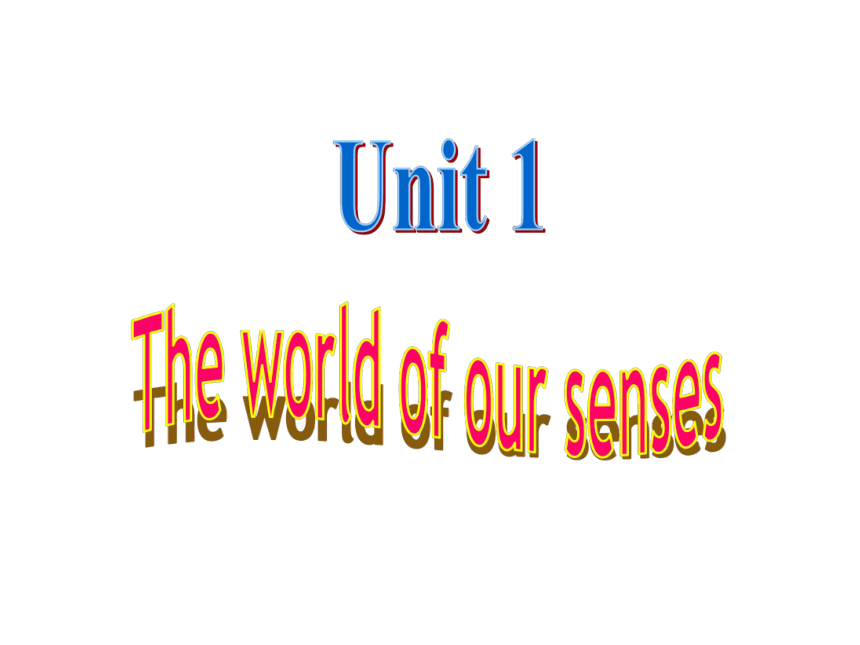
|
|
| 格式 | zip | ||
| 文件大小 | 1.3MB | ||
| 资源类型 | 教案 | ||
| 版本资源 | 牛津译林版 | ||
| 科目 | 英语 | ||
| 更新时间 | 2014-08-11 00:00:00 | ||
图片预览

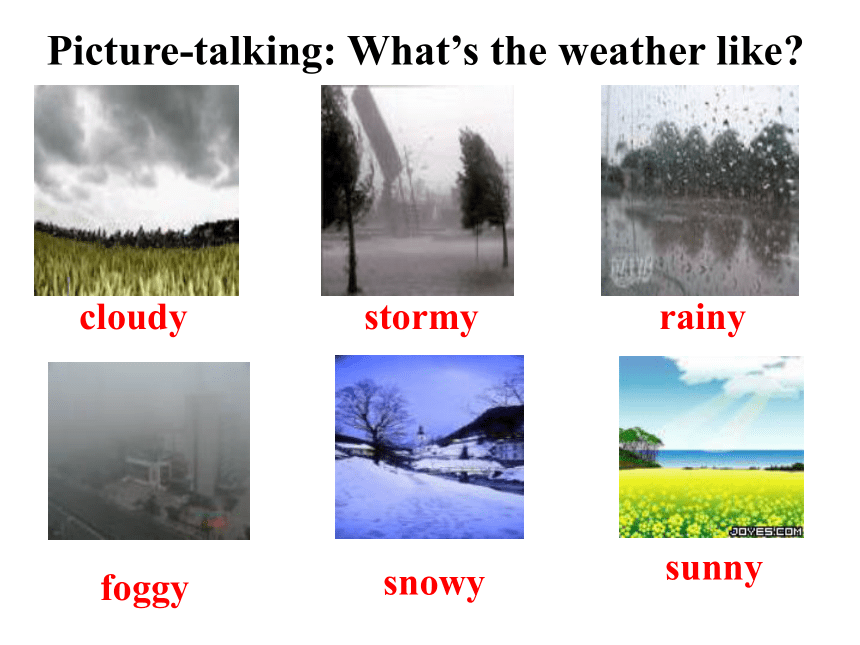
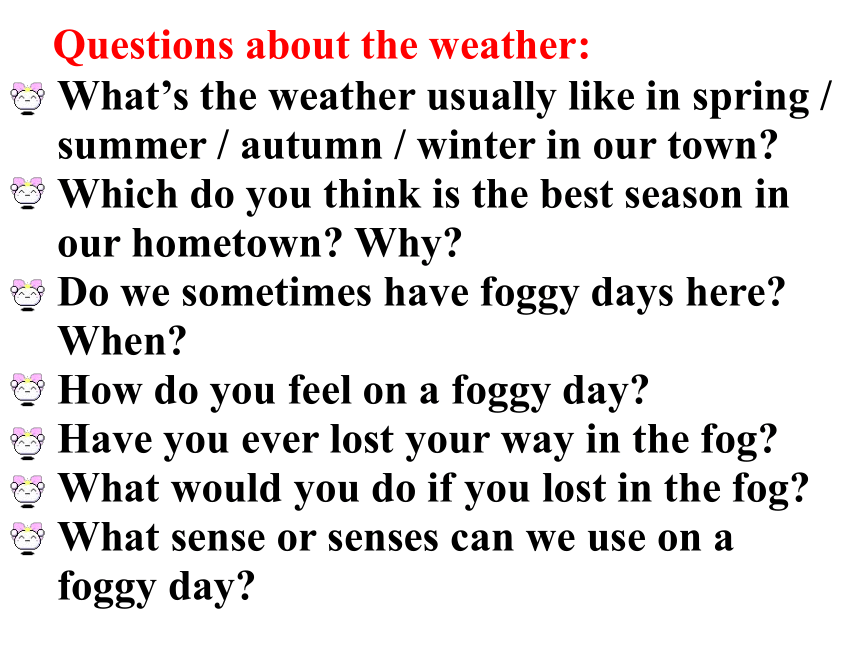
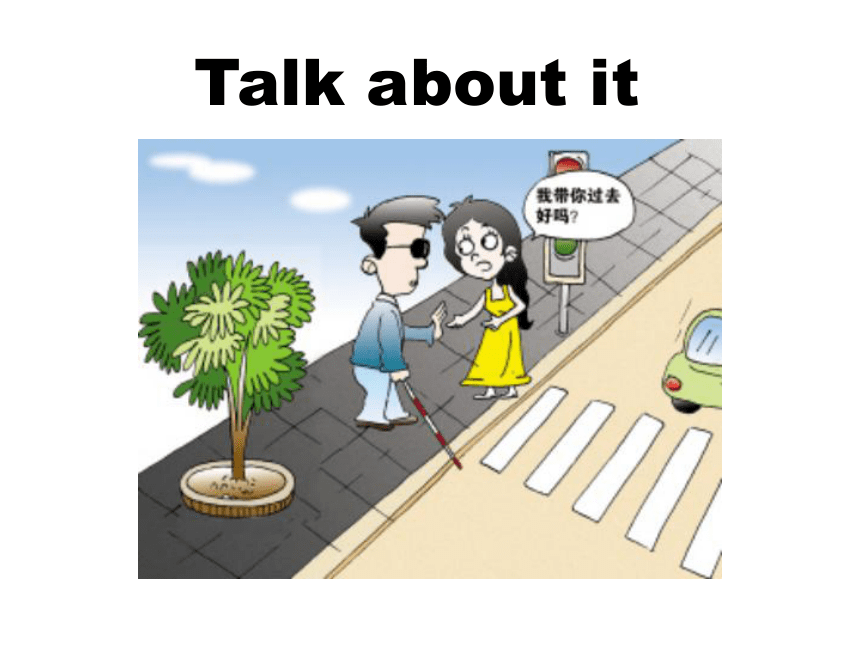
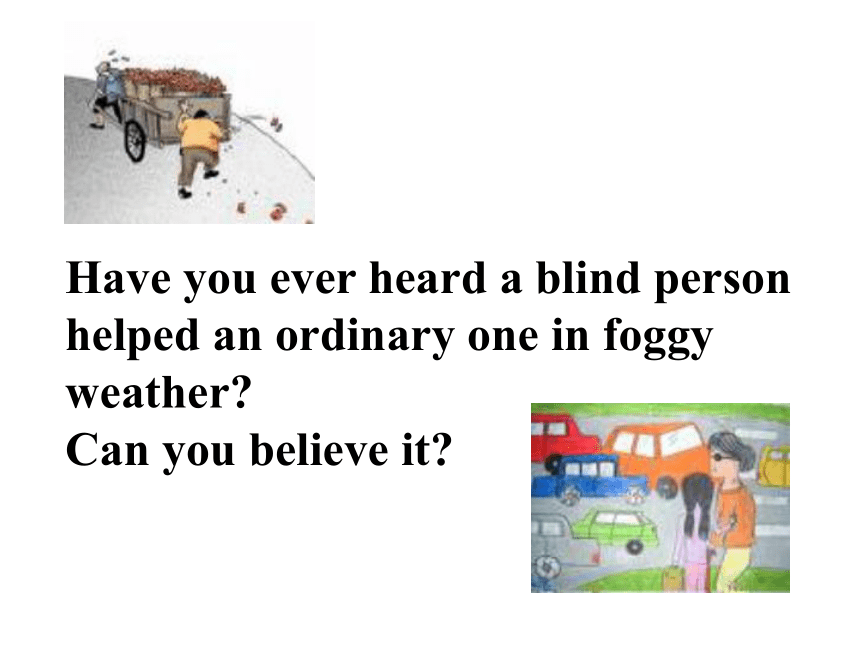

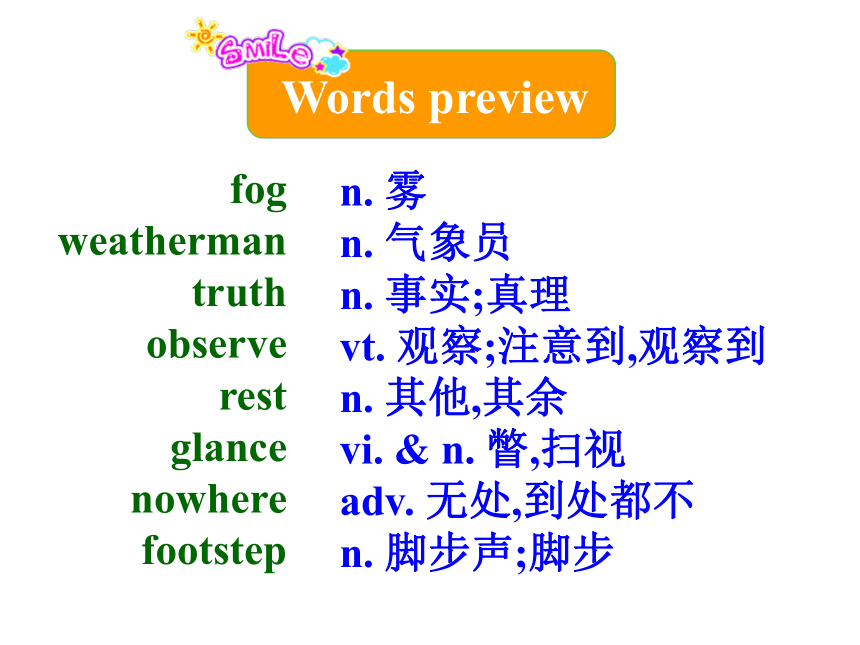
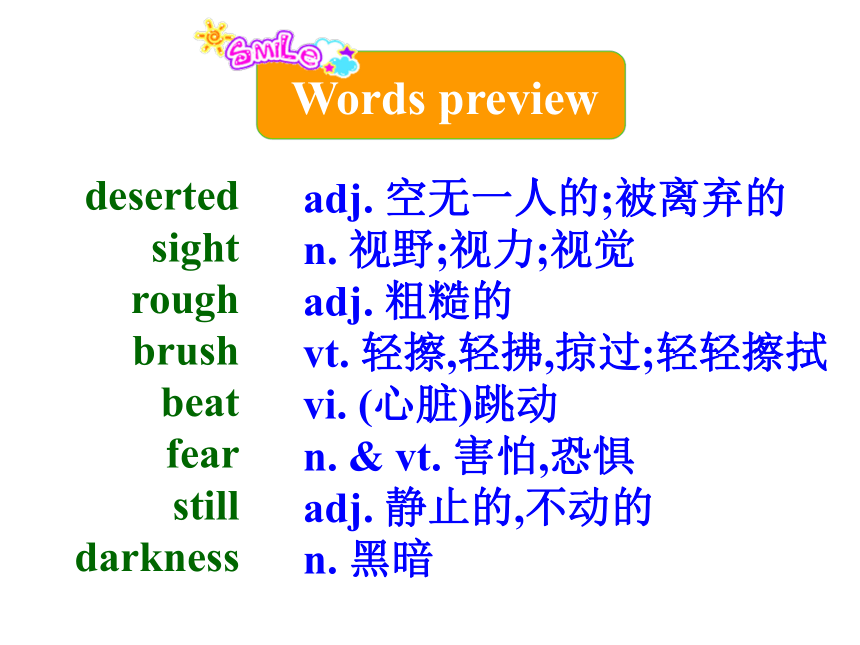
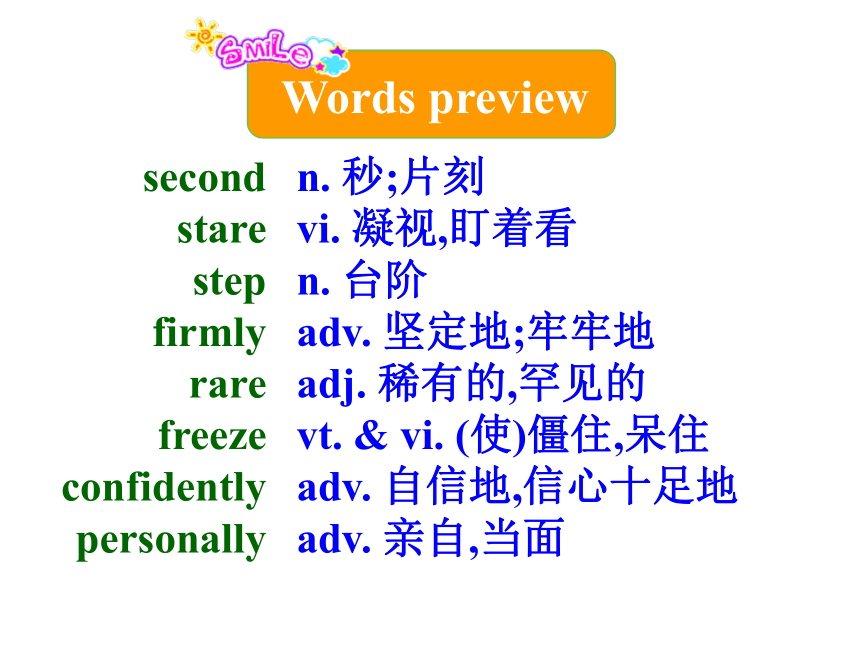
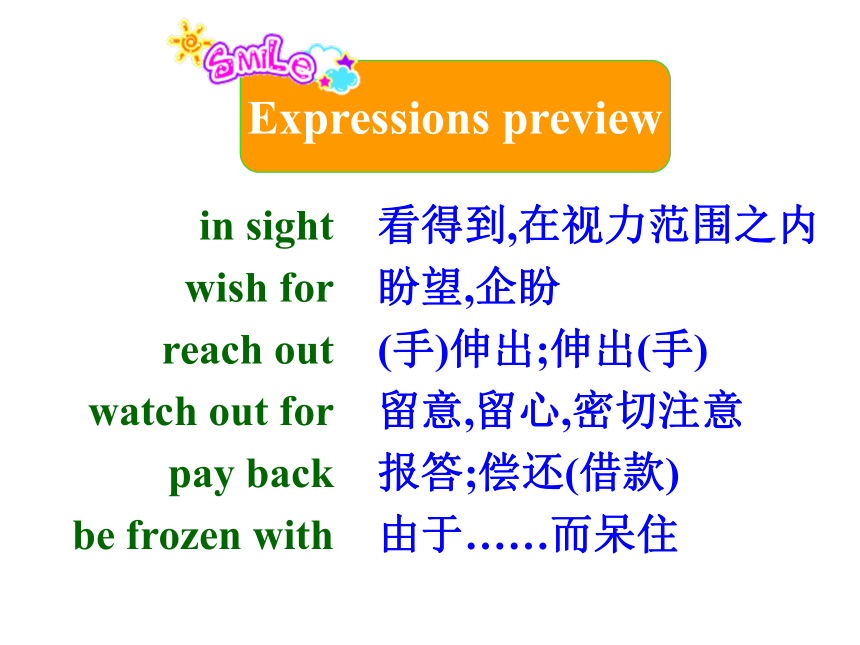
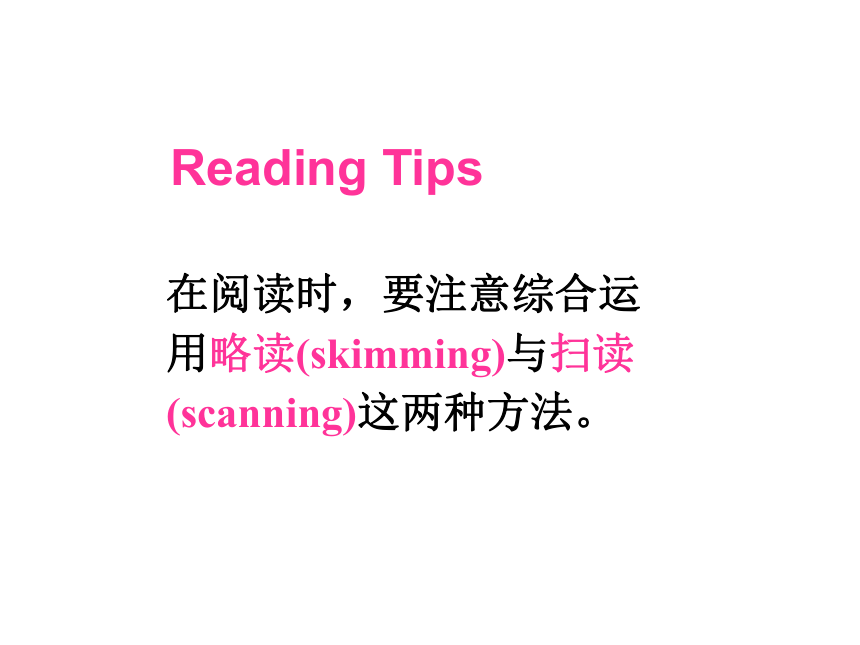
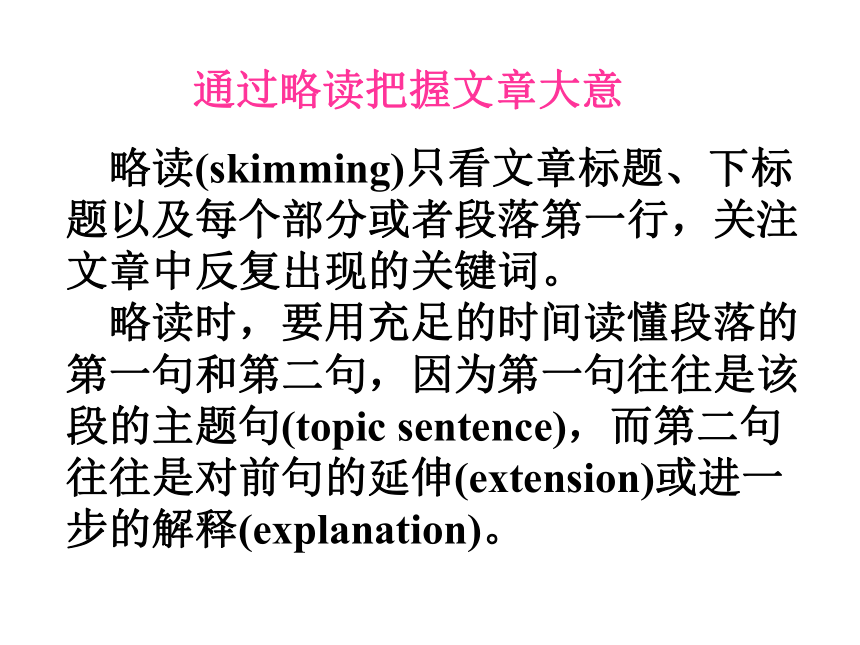
文档简介
课件66张PPT。The world of our sensesUnit 1Picture-talking: What’s the weather like?cloudystormyrainyfoggysnowysunnyQuestions about the weather: What’s the weather usually like in spring / summer / autumn / winter in our town?
Which do you think is the best season in our hometown? Why?
Do we sometimes have foggy days here? When?
How do you feel on a foggy day?
Have you ever lost your way in the fog?
What would you do if you lost in the fog?
What sense or senses can we use on a foggy day? Talk about itHave you ever heard a blind person helped an ordinary one in foggy weather?
Can you believe it?ReadingFogfog
weatherman
truth
observe
rest
glance
nowhere
footstepn. 雾
n. 气象员
n. 事实;真理
vt. 观察;注意到,观察到
n. 其他,其余
vi. & n. 瞥,扫视
adv. 无处,到处都不
n. 脚步声;脚步Words previewdeserted
sight
rough
brush
beat
fear
still
darknessadj. 空无一人的;被离弃的
n. 视野;视力;视觉
adj. 粗糙的
vt. 轻擦,轻拂,掠过;轻轻擦拭
vi. (心脏)跳动
n. & vt. 害怕,恐惧
adj. 静止的,不动的
n. 黑暗Words previewsecond
stare
step
firmly
rare
freeze
confidently
personallyn. 秒;片刻
vi. 凝视,盯着看
n. 台阶
adv. 坚定地;牢牢地
adj. 稀有的,罕见的
vt. & vi. (使)僵住,呆住
adv. 自信地,信心十足地
adv. 亲自,当面Words previewin sight
wish for
reach out
watch out for
pay back
be frozen with看得到,在视力范围之内
盼望,企盼
(手)伸出;伸出(手)
留意,留心,密切注意
报答;偿还(借款)
由于……而呆住Expressions previewReading Tips在阅读时,要注意综合运用略读(skimming)与扫读(scanning)这两种方法。 略读(skimming)只看文章标题、下标题以及每个部分或者段落第一行,关注文章中反复出现的关键词。
略读时,要用充足的时间读懂段落的第一句和第二句,因为第一句往往是该段的主题句(topic sentence),而第二句往往是对前句的延伸(extension)或进一步的解释(explanation)。通过略读把握文章大意运用扫读(scanning)迅速浏览从第三句开始的后面部分,搜寻作者对开头两句的支持句(supporting sentences),并同时注意文章中间是否有转折词(transition),因为这些词常常会把文章的思路逆转或加入其它重要的信息。当读到段落的最后一句时,我们又要使用略读,这时必须再次放慢速度(slow down your pace)直到完全消化作者对段落的小结(conclusion),因为该小结有可能与主题句截然相反或引导读者进入下一个段落。通过扫读寻找特定信息或特定词组Skimming
to get
general ideasSkimmingReading Comprehension IThe main characters of the story are _______.
A. Polly and the weatherman
B. the bus conductor and Polly
C. Polly and the old man
D. the helpful stranger and the
grateful helper2. The story is about ________.
A. a terrible fog in London
B. a young woman being followed
by a tall man
C. Polly, who found her way home
in a fog
D. how Polly, lost in a fog, was helped
by an old manSkimmingReading Comprehension ICareful reading to solve
difficult points1. Once out in the street, she walked quickly towards her usual bus stop. 一到街上,她就急匆匆地向往常乘车的车站走去。
Once out in the street是Once she was out in the street的省略形式。当从句主语与主句主语一致时,从句可省略主语和系动词。例如:
First aid, if (it is) properly done, can save a person’s life.
急救如果做得得法,能拯救人的性命。
I won’t go to the party unless (I am) invited.
除非邀请我,否则我不会参加这个聚会。2. ‘Sorry, Miss,’ replied the man, ‘the truth
is that the fog is too thick for the bus to
run that far.’ “抱歉,小姐”,这男人答道,
“事实上是雾太大了,车开不了那么远。”
句中第一个that引导的是表语从句。例如:
The problem is that we have run out of
money. 问题是我们钱已用完了。
第二个that(或this)在此处等于so,意思是
“那么”(或“这么”),修饰形容词或副词。
例如:
Can hard work change a person that
much? 艰辛会使人变化那么大吗?3. The tall man was nowhere to be seen.
哪儿也看不到那个高个子男人了。
nowhere 无处;到处都不。例如:
The missing wallet is nowhere to be
found.
丢失的钱包任何地方都找不着。
Nowhere else could we find the
missing wallet.
我们任何其他地方都找不到丢失的钱。4. Polly found herself staring up at a man
standing with his hand resting on her arm.
波莉意识到自己正抬头盯着一个男人,他站
着,把手搭在她的胳膊上。
find oneself doing 意识到自己不自觉在干某事
find oneself in/at 意识到自己不自觉地处于某
种(不好的)处境中。例如:
Peter, who was usually shy, found himself
talking to the girls. 彼得,平时很害羞的他,发
现自己竟和这帮女孩搭起话来了。
Finding herself in the mire, Mary had to give
up her adventure. 发现自己陷入困境后,玛
丽不得不放弃她的冒险活动。5. Watch out for the step here.
当心这儿的台阶。
watch out for 留意,留心,密切注意。例如:
Watch out for a tall man in a black hat.
密切注视一个戴黑帽的高个子男人。
standing with his hand resting on her arm现在分词作定语,修饰a man。例如:
The boy standing there is a classmate of mine. 站在那儿的男孩是我的同班同学。Scanning
to get
detail informationScanningReading Comprehension II At 86 King Street. 1. Where did Polly live?2. How did she usually get home? By bus. A stick. 3. What was the old man carrying? When Polly left work, she thought
the buses would still be running.
2. On the bus a tall man gave Polly great help.
3. As Polly walked along to Park Street, the footsteps were always following her.Reading Comprehension III4. A blind man helped Polly because
she once helped him.
5. The blind man did something
useful to pay back the help he once
received.Reading Comprehension IIIReading Comprehension IVFill in the following chart using the information you find in the story Fog to check your understanding of the story.
Part Place Time &
weather Person(s) What happened Polly's thought or feeling Part 1 Part 2 outside Polly's work place at 4 p.m. foggy Polly She left work early. She wondered if the bus would still be running. at the bus stop in the street later Polly;
the bus
con-ductor The fog was too thick for the bus to run to King Street, where Polly lived. \Part Place Time & weather Person(s) What happened Polly's thought or feeling Part 3Part 4
in the Under-ground train; at Green Park station
later Polly; a tall man A tall man in a dark coat is on the train. She sensed she was being watched. in Park Street; at the corner of the street When Polly got to the station, the fog lay like a thick, grey cloud. Polly;
a man A rough hand brushed her face. Her heart was beating with fear. Part Place Time &
weather Person(s) What happened Polly's thought or feelingPart 5 Part 6in the street It was dark.
?
Polly; an old man
The old man took her hand and helped her find the way. She wished for someone to come along.
Fear held her still. She began to feel frightened again. outside Polly's house at King Street late that day
Polly; the old blind man The old man left to help more people in need.Polly was thankful.
Post-reading activities: Suppose one of you is the editor of the newspaper that Polly wrote the letter to. And you want to interview Polly to know more about what happened to her. Please prepare some questions before the interview.Examples:
When do you usually go home after work?
How long does it usually take you to go home from your work place?
How did you feel when you were on the train? Did anything happen?
You were so frightened. What happened before you met the old man?
What made you trust the old man on such a dark, foggy day?
How did you feel when the old man told you that he needed to leave to help more people in need?After reading the text, we learn that
_______________________________.
the old blind man was always ready
to help others
B. it is dangerous for Polly to go home
in such a heavy fog
C. if you get help from others, you
should do something in return
D. every one should give help to those
in troublePost-reading activities: Language pointsShe wondered if the buses would still be running. (p2)
wonder n. 1. [U] feeling caused by sth. unusual, surprising or inexplicable; surprise combined with admiration, bewilderment, etc. look at sth. in wonder; They were filled with wonder when they saw the spaceship. No wonder you were (=It is no wonder you were) so late. He was taken ill, and no wonder, considering that he had been overworking for years. [C] thing or event that causes such feeling: Television is one of the wonders of modern science. for a wonder: it is surprising: For a wonder he paid back the money he had borrowed. It is a wonder (that): it is surprising that: It’s a wonder (that) you didn’t lose your way in the thick fog. What a wonder: how surprising! the seven wonders of the world;
He's a wonder.
vi. & vt. 1. be filled with wonder at I wonder at his rudeness.
I don’t wonder at her being admitted by Beijing University. I wonder (at the fact that), in England, each man speaks a different language. He wondered why people built ugly homes, when they could have beautiful ones. 2. ask oneself (who, what, why, whether, etc.) I wonder who he is (what he wants, why he is late, whether he will come, whose it is).
I was wondering how to get there quickly (where to spend the weekend, etc.). As Polly observed the passengers on the trains, she sensed that she was being watched by a tall man in a dark coat. (p2)observe the behavior of birds;
Scientists use lots of different instruments and techniques to observe the Sun.
I have never observed him do otherwise. He observed that it had turned cloudy.
He observes keenly but says little. observe vi. & vt. 1. see and notice; watch carefully:2. pay attention to (rules, etc.); celebrate
(festivals, birthdays, anniversaries, etc.): 1. Do they observe Christmas Day in that
country?
2. Tonight, we celebrate the Mid-Autumn
Festival. What started as a Harvest Festival
later became associated with the legends of
"CHANG ER" – the beautiful lady in the
moon. While scientific discoveries and space
exploration have put paid to (结束,打破)
any notion of fairies on the moon, many still
observe the festivals for the value they add
to family togetherness and social bonding.(1995全国Ⅱ 完形填空)
Scientists hope to ____ more about people by studying our closest, relative (亲属) —chimpanzee (黑猩猩).
A. observe B. discover C. gain D. learn
解析:科学家希望通过我们的近亲——黑猩猩的研究来了解人类。答案 D
While the rest of the passengers were getting out, she glanced at the faces around her. (p2)
glance n. quick look: take a glance at the newspaper headline see sth. at a glance
vt. & vi. 1. take a quick look (at, over, through, etc.): glance at the clock;
glance over/through a letter;
glance round a room;
The man glanced the burglar climbing out of the window. There was no one in sight. (p2)
sight n.
at first sight 一见就......., 初次看见时
at the sight of 一看见就......
be in/within sight 看得见, 在眼前
go/be/get out of sight 看不见了
catch [have, gain, get] sight of 发现, 看出
come in [into] sight 呈现在眼前
come in sight of 看见
in one's own sight
由自己的眼光看来, 照自己的见解
in sb.'s sight
在某人面前; 照某人的眼光看来
in the sight of
由......看来, 从......观点, 从......角度来看
keep sth. in sight (=keep sight of sth.)
不忘记
lose one’s sight 失明
lose sight of 不再看见;忘了; 忽略了
have long [far] sight 远视; 有远见
short [near] sight 近视, 缺乏远见
1. At first sight the problem seemed very
difficult.
2. He fell in love with her at first sight.
3. At the sight of the police officers the men ran
off.
4. Victory was not yet in sight/still out of sight.
5. We are not yet within sight of the end of this
wearisome task.
6. Keep out of my sight.
7. Do what is right in your own sight.
8. This letter is for your sight only.
9. Their first sight of land came after three days
at sea.
10. Out of sight, out of mind. 眼不见, 心不烦。 [2007 安徽]
The practice of hanging clothes across the street is a common ______ in many parts of the city.
A. look B. sign
C. sight D. appearance2006NMET V. 改错题
Suddenly, I caught a sight of my English teacher in 91. __________
解析: catch sight of 看见, 是固定短语。故答案为去掉a
A few seconds later, a hand reached out and touched her arm. (p2) reach vt. & vi. 1. stretch out:
He reached out for the knife, but it was too far away.
He reached out for the dictionary. 2. get to, go as far as: Can you reach the branch with those red apples?
Not a sound reached our ears.
The heat of summer has reached its climax.
The two sides were unable to reach an agreement.be out of reach of sb./be out of sb.’s reach
在某人够不到的地方
beyond [above, out of] sb.’s [the] reach
达不到的, 力所不及的; 不能理解
make a reach for (sb / sth.)
伸出手; 企图抓住...…
within easy reach of
在容易达到......的地方; 在......的附近
within sb.’s reach
在某人力所能及的范围内, 在某人能到达的范围内 [2007 江苏]
At the end of the meeting, it was announced that an agreement ______.
A. has been reached
B. had been reached
C. has reached
D. had reached Let’s keep to the point or we ____
any decisions.(2008全国)
??? A. will never reach
??? B. have never reached?
??? C. never reach
??? D. never reachedIt gives me the chance to pay back the help that people give me when it’s sunny. (p3)pay - paid - paying
vt. & vi. 1. give (sb.) money for goods, service, etc. You must pay me what you owe.
Do you know the television commercials promoting an automotive oil filter that featured the statement “You can pay me now, or pay me later”? 2. hand over (money) to; settle:
pay one’s debts;
If you have not paid by 15 November 2005, your membership benefits will cease from the end of this year.
3. give (attention, respect, etc., to sb.):
Please pay more attention to your lessons.
4. pay for: hand over the price of; bear the cost of:
He will have to pay for this foolish behavior. Quiz I: Complete Part C1 individually to check your reading comprehension and to test your analytical thinking skill.1. Why did Polly leave work early?
2. Why did Polly take the Underground train to Green park?
3. What was the weather like outside the train station?4. According to lines 22-24, what made Polly afraid?
5. According to line 33, what did the man look like?
6. How could the man tell that Polly was young?1 Because there was a thick fog that afternoon, she wondered if the bus would still be running in the fog.2 Because the fog was too thick for the bus to go to King Street.3 The fog lay like a thick, grey cloud.Answers4 The rough hand that brushed her face and the man’s voice that was close to her ear made Polly afraid.5 He looked old.6 He could tell Polly was young by hearing her voice.He is lying and there is no __________
(实话) in what he says.
2. I spent some time ___________ (观察) their customs.
3. Her hands were ___________ (粗糙) with hard work.Quiz II: 根据每句话的汉语提示,在横线上填一单词,使句意完整(注意词形变化)。 truthobservingrough4. The little girl held her mother’s
hand _________ (牢牢地).
5. A large sound was heard out of the
dark room, and I was ________ (呆住
了) with fear.firmlyfrozen 根据每句话的汉语提示,在横线上填一单词,使句意完整(注意词形变化)。 Quiz II:当我在街上走的时候,我听到有人从
后面叫我。
_____________________________, I heard someone _______ me from behind.
2. 丢失的钱包任何地方都找不着。
The missing wallet is ______________________.
3. 过马路时, 要当心过往车辆。
While crossing the street, ____________ the passing cars.Quiz III: 根据所给汉语句子,完成各句后
面的英语翻译(每空一词)。While I was walking in the streetcallingnowhere to be foundwatch out forComplete Parts D and E. Part D aims to improve your ability of understanding the meaning of a new word from the context and matching it with the correct explanation in English. Part E is a letter Polly has written to a newspaper to thank the old man. It aims to make you more familiar with the text. You need to first understand the letter and then fill in the blanks with the proper words given.HomeworkHomeworkRetelling the story in the following order:
Outside Polly’s working place → At the bus stop on the street → In the underground train → At Green Park station → In Park Street → At the corner of the street → In the street near King Street → At 86 King StreetThank you!
Which do you think is the best season in our hometown? Why?
Do we sometimes have foggy days here? When?
How do you feel on a foggy day?
Have you ever lost your way in the fog?
What would you do if you lost in the fog?
What sense or senses can we use on a foggy day? Talk about itHave you ever heard a blind person helped an ordinary one in foggy weather?
Can you believe it?ReadingFogfog
weatherman
truth
observe
rest
glance
nowhere
footstepn. 雾
n. 气象员
n. 事实;真理
vt. 观察;注意到,观察到
n. 其他,其余
vi. & n. 瞥,扫视
adv. 无处,到处都不
n. 脚步声;脚步Words previewdeserted
sight
rough
brush
beat
fear
still
darknessadj. 空无一人的;被离弃的
n. 视野;视力;视觉
adj. 粗糙的
vt. 轻擦,轻拂,掠过;轻轻擦拭
vi. (心脏)跳动
n. & vt. 害怕,恐惧
adj. 静止的,不动的
n. 黑暗Words previewsecond
stare
step
firmly
rare
freeze
confidently
personallyn. 秒;片刻
vi. 凝视,盯着看
n. 台阶
adv. 坚定地;牢牢地
adj. 稀有的,罕见的
vt. & vi. (使)僵住,呆住
adv. 自信地,信心十足地
adv. 亲自,当面Words previewin sight
wish for
reach out
watch out for
pay back
be frozen with看得到,在视力范围之内
盼望,企盼
(手)伸出;伸出(手)
留意,留心,密切注意
报答;偿还(借款)
由于……而呆住Expressions previewReading Tips在阅读时,要注意综合运用略读(skimming)与扫读(scanning)这两种方法。 略读(skimming)只看文章标题、下标题以及每个部分或者段落第一行,关注文章中反复出现的关键词。
略读时,要用充足的时间读懂段落的第一句和第二句,因为第一句往往是该段的主题句(topic sentence),而第二句往往是对前句的延伸(extension)或进一步的解释(explanation)。通过略读把握文章大意运用扫读(scanning)迅速浏览从第三句开始的后面部分,搜寻作者对开头两句的支持句(supporting sentences),并同时注意文章中间是否有转折词(transition),因为这些词常常会把文章的思路逆转或加入其它重要的信息。当读到段落的最后一句时,我们又要使用略读,这时必须再次放慢速度(slow down your pace)直到完全消化作者对段落的小结(conclusion),因为该小结有可能与主题句截然相反或引导读者进入下一个段落。通过扫读寻找特定信息或特定词组Skimming
to get
general ideasSkimmingReading Comprehension IThe main characters of the story are _______.
A. Polly and the weatherman
B. the bus conductor and Polly
C. Polly and the old man
D. the helpful stranger and the
grateful helper2. The story is about ________.
A. a terrible fog in London
B. a young woman being followed
by a tall man
C. Polly, who found her way home
in a fog
D. how Polly, lost in a fog, was helped
by an old manSkimmingReading Comprehension ICareful reading to solve
difficult points1. Once out in the street, she walked quickly towards her usual bus stop. 一到街上,她就急匆匆地向往常乘车的车站走去。
Once out in the street是Once she was out in the street的省略形式。当从句主语与主句主语一致时,从句可省略主语和系动词。例如:
First aid, if (it is) properly done, can save a person’s life.
急救如果做得得法,能拯救人的性命。
I won’t go to the party unless (I am) invited.
除非邀请我,否则我不会参加这个聚会。2. ‘Sorry, Miss,’ replied the man, ‘the truth
is that the fog is too thick for the bus to
run that far.’ “抱歉,小姐”,这男人答道,
“事实上是雾太大了,车开不了那么远。”
句中第一个that引导的是表语从句。例如:
The problem is that we have run out of
money. 问题是我们钱已用完了。
第二个that(或this)在此处等于so,意思是
“那么”(或“这么”),修饰形容词或副词。
例如:
Can hard work change a person that
much? 艰辛会使人变化那么大吗?3. The tall man was nowhere to be seen.
哪儿也看不到那个高个子男人了。
nowhere 无处;到处都不。例如:
The missing wallet is nowhere to be
found.
丢失的钱包任何地方都找不着。
Nowhere else could we find the
missing wallet.
我们任何其他地方都找不到丢失的钱。4. Polly found herself staring up at a man
standing with his hand resting on her arm.
波莉意识到自己正抬头盯着一个男人,他站
着,把手搭在她的胳膊上。
find oneself doing 意识到自己不自觉在干某事
find oneself in/at 意识到自己不自觉地处于某
种(不好的)处境中。例如:
Peter, who was usually shy, found himself
talking to the girls. 彼得,平时很害羞的他,发
现自己竟和这帮女孩搭起话来了。
Finding herself in the mire, Mary had to give
up her adventure. 发现自己陷入困境后,玛
丽不得不放弃她的冒险活动。5. Watch out for the step here.
当心这儿的台阶。
watch out for 留意,留心,密切注意。例如:
Watch out for a tall man in a black hat.
密切注视一个戴黑帽的高个子男人。
standing with his hand resting on her arm现在分词作定语,修饰a man。例如:
The boy standing there is a classmate of mine. 站在那儿的男孩是我的同班同学。Scanning
to get
detail informationScanningReading Comprehension II At 86 King Street. 1. Where did Polly live?2. How did she usually get home? By bus. A stick. 3. What was the old man carrying? When Polly left work, she thought
the buses would still be running.
2. On the bus a tall man gave Polly great help.
3. As Polly walked along to Park Street, the footsteps were always following her.Reading Comprehension III4. A blind man helped Polly because
she once helped him.
5. The blind man did something
useful to pay back the help he once
received.Reading Comprehension IIIReading Comprehension IVFill in the following chart using the information you find in the story Fog to check your understanding of the story.
Part Place Time &
weather Person(s) What happened Polly's thought or feeling Part 1 Part 2 outside Polly's work place at 4 p.m. foggy Polly She left work early. She wondered if the bus would still be running. at the bus stop in the street later Polly;
the bus
con-ductor The fog was too thick for the bus to run to King Street, where Polly lived. \Part Place Time & weather Person(s) What happened Polly's thought or feeling Part 3Part 4
in the Under-ground train; at Green Park station
later Polly; a tall man A tall man in a dark coat is on the train. She sensed she was being watched. in Park Street; at the corner of the street When Polly got to the station, the fog lay like a thick, grey cloud. Polly;
a man A rough hand brushed her face. Her heart was beating with fear. Part Place Time &
weather Person(s) What happened Polly's thought or feelingPart 5 Part 6in the street It was dark.
?
Polly; an old man
The old man took her hand and helped her find the way. She wished for someone to come along.
Fear held her still. She began to feel frightened again. outside Polly's house at King Street late that day
Polly; the old blind man The old man left to help more people in need.Polly was thankful.
Post-reading activities: Suppose one of you is the editor of the newspaper that Polly wrote the letter to. And you want to interview Polly to know more about what happened to her. Please prepare some questions before the interview.Examples:
When do you usually go home after work?
How long does it usually take you to go home from your work place?
How did you feel when you were on the train? Did anything happen?
You were so frightened. What happened before you met the old man?
What made you trust the old man on such a dark, foggy day?
How did you feel when the old man told you that he needed to leave to help more people in need?After reading the text, we learn that
_______________________________.
the old blind man was always ready
to help others
B. it is dangerous for Polly to go home
in such a heavy fog
C. if you get help from others, you
should do something in return
D. every one should give help to those
in troublePost-reading activities: Language pointsShe wondered if the buses would still be running. (p2)
wonder n. 1. [U] feeling caused by sth. unusual, surprising or inexplicable; surprise combined with admiration, bewilderment, etc. look at sth. in wonder; They were filled with wonder when they saw the spaceship. No wonder you were (=It is no wonder you were) so late. He was taken ill, and no wonder, considering that he had been overworking for years. [C] thing or event that causes such feeling: Television is one of the wonders of modern science. for a wonder: it is surprising: For a wonder he paid back the money he had borrowed. It is a wonder (that): it is surprising that: It’s a wonder (that) you didn’t lose your way in the thick fog. What a wonder: how surprising! the seven wonders of the world;
He's a wonder.
vi. & vt. 1. be filled with wonder at I wonder at his rudeness.
I don’t wonder at her being admitted by Beijing University. I wonder (at the fact that), in England, each man speaks a different language. He wondered why people built ugly homes, when they could have beautiful ones. 2. ask oneself (who, what, why, whether, etc.) I wonder who he is (what he wants, why he is late, whether he will come, whose it is).
I was wondering how to get there quickly (where to spend the weekend, etc.). As Polly observed the passengers on the trains, she sensed that she was being watched by a tall man in a dark coat. (p2)observe the behavior of birds;
Scientists use lots of different instruments and techniques to observe the Sun.
I have never observed him do otherwise. He observed that it had turned cloudy.
He observes keenly but says little. observe vi. & vt. 1. see and notice; watch carefully:2. pay attention to (rules, etc.); celebrate
(festivals, birthdays, anniversaries, etc.): 1. Do they observe Christmas Day in that
country?
2. Tonight, we celebrate the Mid-Autumn
Festival. What started as a Harvest Festival
later became associated with the legends of
"CHANG ER" – the beautiful lady in the
moon. While scientific discoveries and space
exploration have put paid to (结束,打破)
any notion of fairies on the moon, many still
observe the festivals for the value they add
to family togetherness and social bonding.(1995全国Ⅱ 完形填空)
Scientists hope to ____ more about people by studying our closest, relative (亲属) —chimpanzee (黑猩猩).
A. observe B. discover C. gain D. learn
解析:科学家希望通过我们的近亲——黑猩猩的研究来了解人类。答案 D
While the rest of the passengers were getting out, she glanced at the faces around her. (p2)
glance n. quick look: take a glance at the newspaper headline see sth. at a glance
vt. & vi. 1. take a quick look (at, over, through, etc.): glance at the clock;
glance over/through a letter;
glance round a room;
The man glanced the burglar climbing out of the window. There was no one in sight. (p2)
sight n.
at first sight 一见就......., 初次看见时
at the sight of 一看见就......
be in/within sight 看得见, 在眼前
go/be/get out of sight 看不见了
catch [have, gain, get] sight of 发现, 看出
come in [into] sight 呈现在眼前
come in sight of 看见
in one's own sight
由自己的眼光看来, 照自己的见解
in sb.'s sight
在某人面前; 照某人的眼光看来
in the sight of
由......看来, 从......观点, 从......角度来看
keep sth. in sight (=keep sight of sth.)
不忘记
lose one’s sight 失明
lose sight of 不再看见;忘了; 忽略了
have long [far] sight 远视; 有远见
short [near] sight 近视, 缺乏远见
1. At first sight the problem seemed very
difficult.
2. He fell in love with her at first sight.
3. At the sight of the police officers the men ran
off.
4. Victory was not yet in sight/still out of sight.
5. We are not yet within sight of the end of this
wearisome task.
6. Keep out of my sight.
7. Do what is right in your own sight.
8. This letter is for your sight only.
9. Their first sight of land came after three days
at sea.
10. Out of sight, out of mind. 眼不见, 心不烦。 [2007 安徽]
The practice of hanging clothes across the street is a common ______ in many parts of the city.
A. look B. sign
C. sight D. appearance2006NMET V. 改错题
Suddenly, I caught a sight of my English teacher in 91. __________
解析: catch sight of 看见, 是固定短语。故答案为去掉a
A few seconds later, a hand reached out and touched her arm. (p2) reach vt. & vi. 1. stretch out:
He reached out for the knife, but it was too far away.
He reached out for the dictionary. 2. get to, go as far as: Can you reach the branch with those red apples?
Not a sound reached our ears.
The heat of summer has reached its climax.
The two sides were unable to reach an agreement.be out of reach of sb./be out of sb.’s reach
在某人够不到的地方
beyond [above, out of] sb.’s [the] reach
达不到的, 力所不及的; 不能理解
make a reach for (sb / sth.)
伸出手; 企图抓住...…
within easy reach of
在容易达到......的地方; 在......的附近
within sb.’s reach
在某人力所能及的范围内, 在某人能到达的范围内 [2007 江苏]
At the end of the meeting, it was announced that an agreement ______.
A. has been reached
B. had been reached
C. has reached
D. had reached Let’s keep to the point or we ____
any decisions.(2008全国)
??? A. will never reach
??? B. have never reached?
??? C. never reach
??? D. never reachedIt gives me the chance to pay back the help that people give me when it’s sunny. (p3)pay - paid - paying
vt. & vi. 1. give (sb.) money for goods, service, etc. You must pay me what you owe.
Do you know the television commercials promoting an automotive oil filter that featured the statement “You can pay me now, or pay me later”? 2. hand over (money) to; settle:
pay one’s debts;
If you have not paid by 15 November 2005, your membership benefits will cease from the end of this year.
3. give (attention, respect, etc., to sb.):
Please pay more attention to your lessons.
4. pay for: hand over the price of; bear the cost of:
He will have to pay for this foolish behavior. Quiz I: Complete Part C1 individually to check your reading comprehension and to test your analytical thinking skill.1. Why did Polly leave work early?
2. Why did Polly take the Underground train to Green park?
3. What was the weather like outside the train station?4. According to lines 22-24, what made Polly afraid?
5. According to line 33, what did the man look like?
6. How could the man tell that Polly was young?1 Because there was a thick fog that afternoon, she wondered if the bus would still be running in the fog.2 Because the fog was too thick for the bus to go to King Street.3 The fog lay like a thick, grey cloud.Answers4 The rough hand that brushed her face and the man’s voice that was close to her ear made Polly afraid.5 He looked old.6 He could tell Polly was young by hearing her voice.He is lying and there is no __________
(实话) in what he says.
2. I spent some time ___________ (观察) their customs.
3. Her hands were ___________ (粗糙) with hard work.Quiz II: 根据每句话的汉语提示,在横线上填一单词,使句意完整(注意词形变化)。 truthobservingrough4. The little girl held her mother’s
hand _________ (牢牢地).
5. A large sound was heard out of the
dark room, and I was ________ (呆住
了) with fear.firmlyfrozen 根据每句话的汉语提示,在横线上填一单词,使句意完整(注意词形变化)。 Quiz II:当我在街上走的时候,我听到有人从
后面叫我。
_____________________________, I heard someone _______ me from behind.
2. 丢失的钱包任何地方都找不着。
The missing wallet is ______________________.
3. 过马路时, 要当心过往车辆。
While crossing the street, ____________ the passing cars.Quiz III: 根据所给汉语句子,完成各句后
面的英语翻译(每空一词)。While I was walking in the streetcallingnowhere to be foundwatch out forComplete Parts D and E. Part D aims to improve your ability of understanding the meaning of a new word from the context and matching it with the correct explanation in English. Part E is a letter Polly has written to a newspaper to thank the old man. It aims to make you more familiar with the text. You need to first understand the letter and then fill in the blanks with the proper words given.HomeworkHomeworkRetelling the story in the following order:
Outside Polly’s working place → At the bus stop on the street → In the underground train → At Green Park station → In Park Street → At the corner of the street → In the street near King Street → At 86 King StreetThank you!
